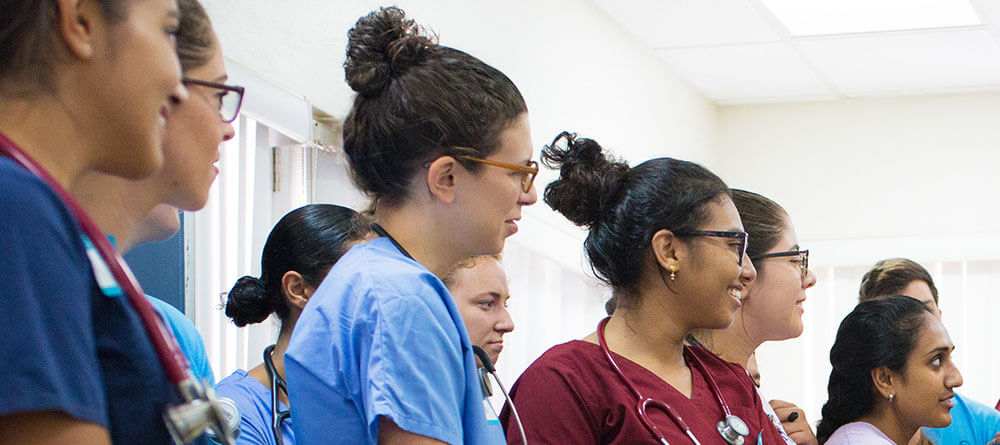Identifying the right med school involves considering an array of factors. Future medical students often look into how well different schools fare on licensing exams or whether there are opportunities to pursue research projects. One especially critical element to research when choosing a school is data from the National Resident Matching Program’s (NRMP) Main Residency Match, often referred to as “The Match.”
“The Match is how you get your residency,” explains Dr. John Madden, a professor of emergency medicine, an associate dean of students, and director of the Office of Career Guidance and Student Development at St. George’s University (SGU).
Before digging into how NRMP match data can help in selecting a medical school, it’s important to understand how the matching process works.
How does residency match work?

There are numerous systems students use to secure residency positions, such as the Joint Service Graduate Medical Education Selection Board (JSGMESB), the San Francisco Match, and the American Urological Association (AUA) Urology Residency Match Program. That said, most students attending schools in the US and some international locations match through the NRMP, and they submit their applications through the Electronic Residency Application Service (ERAS).
Residency programs begin extending interview offers to applicants once Medical Student Performance Evaluations (MSPEs) start in early October. It’s important to focus on absorbing as much information as possible during this residency application milestone because interviews will inform your eventual list of programs, which are ranked in order of preference. Programs do the same thing, except they list applicants from most desirable to least desirable.
“A match occurs when a medical student and a residency program both choose each other,” explains Dan Lee, cofounder of Solomon Admissions Consulting. Results for The Match are released in March.
While there’s no obligation to rank every program, Impact of Length of Rank Order List on Match Results: 2002–2021 Main Residency Match from the NRMP shows a longer list is associated with a higher likelihood of matching. There are options for those who don’t secure a placement through The Match, such as the Supplemental Offer Acceptance Program (SOAP) or internships, but these are certainly not ideal choices.
How does medical school residency match information help with your selection?

Securing a residency is arguably the single most important step toward becoming a doctor, so you will want to evaluate NRMP match data for each school you are considering. Here are some of the ways it can inform your final decision on which medical school to attend.
You can easily see which schools help students succeed
You want to go for a school where the vast majority of graduates match into a program. U.S. News & World Report notes many medical schools list general information on how many students obtain postgraduate positions. Just note this doesn’t give you the full picture.
“Schools will list where their graduates matched, which gives you an idea, but you don’t know the denominator,” Dr. Madden points out. It might sound great to read that 250 graduates obtained a residency, but it’s not particularly impressive if there were 500 people in the class.
You can pick the right school for the specialty that interests you
A school’s residency placements can tell you a lot about how well the program can prepare you for a specific career path. Lee suggests prospective students ask about a school’s percentage of residency placements in the specialty they want to pursue.
“Some schools have higher percentages than others because those departments have outstanding training and opportunities, such as research for medical students,” Lee says.
A medical school can also earn a positive reputation for certain specialties among residency programs. Lee explains residency programs tend to choose applicants who have completed their education at institutions they hold in high esteem.
Residency placement data can help you plan your life
Aside from finding out which specialties students at a given school match into, you might also want to consider looking at the specific residency locations. This might sound nitpicky, but residents need to spend a handful of years living where their program is located.
An article from the American Medical Association’s AMA Wire points out that residents with families may want to prioritize a smaller city with a low cost of living that fits their lifestyle. Those who crave city life should take that into consideration when analyzing residency placement information. As for students who long to be close to family and friends, they might want to focus on programs near where they’re from.

Take your investigation a step further
Now that you know how important it is to learn about each school’s residency match information, start researching. You might find you have to directly contact individual admissions teams for answers to all your questions, including those that aren’t related to NRMP match data.
Make sure you get the most out of these conversations by reading “8 Questions You Should Be Asking the Medical School Admissions Team.”
*This article was originally published in February 2018. It has since been updated to include information relevant to 2021.

